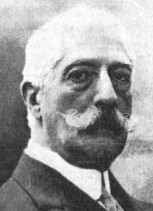- Giovanni Verga
Infobox Writer
name =Giovanni Verga
 |right|frame
|right|frame
caption =
birthdate = birth date|1840|9|2|df=y
birthplace =Catania ,Italy 1
deathdate = death date and age|1922|1|27|1840|9|2|df=y
deathplace =Catania ,Italy
occupation = Writer
genre =
movement = realist
influences =
website =Giovanni Verga (
2 September 1840 -27 January 1922 ) was an Italian realistwriter , best known for his depictions of life inSicily , and especially for theshort story "Cavalleria Rusticana " and the novel "I Malavoglia ".The first son of Giovanni Battista Catalano Verga and Caterina Di Mauro, Verga was born into a prosperous family of
Catania in Sicily. He began writing in his teens, producing the largely unpublishedhistorical novel "Amore e Patria" ("Love and Country"); then, although nominally studyinglaw at theUniversity of Catania , he used money his father had given him to publish his "I Carbonari della Montagna" ("The Carbonari of the Mountain") in 1861 and 1862. This was followed by "Sulle Lagune" ("In the Lagoons") in 1863.Meanwhile, Verga had been serving in the
Catania National Guard (1860-64), after which he travelled toFlorence several times, settling there in 1869.He moved to
Milan in 1872, where he developed his new approach, characterized by the use ofdialogue to develop character, which resulted in his most significant works. In 1880 his story collection "Vita dei Campi" ("Life in the Fields"), (including Fantasticheria, La Lupa, and Pentolacchia) most of which were about rural Sicily, came out; it included the "Cavalleria Rusticana", which was adapted for thetheatre and later thelibretto of theMascagni opera . Verga'sshort story , "Malaria ", was one of the first literary depictions of the disease.He then embarked on a projected series of five novels, but only completed two, "
I Malavoglia " and "Mastro-Don Gesualdo " (1889), the latter of which was the last major work of his literary career. Both are widely recognized as masterpieces.In 1894 Verga moved back to the house he was born in. In 1920 he was elected a senator. He died of a cerebral
thrombosis in 1922.Bibliography
Novels
* "Love and homeland" (1856-1857)
* "Carbonari of the mountain" (1861-1862)
* "On the lagoons" (1862-1863)
* "A sinner" (1866)
* "History of Capinera" (1871)
* "Eva" (1873) [ [http://www.digitami.it/opera.do?operaId=37 Digitami] ]
* "Eros" (1875)
* "Royal tiger" (1875)
* "I Malavoglia " (1881)
* "Elena's husband" (1882)
* "Mastro-don Gesualdo " (1889)
* "From your to my" (1905)hort stories
* "Nedda" (1874)Spring and other story (1877)
* "Spring"
* " The tail of the devil"
* "X"
* "Certain subjects"
* "The stories of the Trezza's castle"The life of the fields (1880)
* "Rustican cavalry"Links
*it [http://digilander.libero.it/letteratura_verga/index.html Giovanni Verga: all the works]
* [http://www.classicistranieri.com/dblog/articolo.asp?articolo=1899 I Malavoglia] free e-book
* [http://www.ilnarratore.org/show.php?type=author&language=en&aid=72&tpl=/eng/autore.tpl.html "I Malavoglia - chapter 1"] on audio mp3 for freeNotes
Wikimedia Foundation. 2010.
